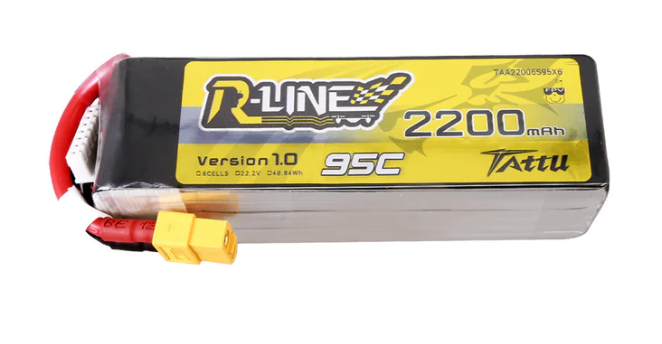Tattu R-Line 2200mAh 95C 6S1P lipo battery pack is the best FPV lipo battery with high quality and reliable power and local service. Suitable for 7” lightweight cinelifter and 7" long range FPV.
What is R-Line? R-Line is a brand new product line specifically designed for professional FPV racing competitions. It's the selling version of Toppilot batteries. It's also a subsidiary of the Tattu brand. It's got higher capacity, lower internal resistance, and lower landing temperatures. They are more powerful than any graphene battery. Generally, R-Line batteries have the same specs as our popular Toppilot batteries. There are different R-Line versions for the needs of different FPV racing competitions.
Features:
- High quality, reliable power.
- Stable automatic stacking technology enables single-cell capacities of 2200mAh.
- Higher capacity than comparable size packs.
- More high C rate. Designed for professional FPV racing.
- No memory effect.
Specifications:
- Minimum Capacity: 2200mAh
- Configuration: 6S1P / 22.2V / 6Cells
- Discharge Rate: 95C
- Net Weight(±20g): 321g
- Dimensions: 116mm x 34mm x38.5mm (L x W x H)
- Connector Type: XT60
- Balancer Connector Type: JST-XHR
Lipo Battery Safety
- Batteries should NEVER be left unattended while charging.
- Be absolutely sure that the Lithium Polymer charger settings are correct for the battery pack being charged – both voltage and current settings.
- Lithium Polymer must be CHARGED and STORED in a fire-safe container like a Lipo Sack.
- Do not charge batteries near flammable items or liquids.
- Keep a dry fire extinguisher nearby or a large bucket of dry sand, which is a cheap and effective extinguisher.
- Never charge inside an automobile even when parked.
- KEEP BATTERIES AWAY from children and pets at ALL times.
- Never discharge below 3.5V per cell as it may cause permanent damage and void warranty
- The battery may explode if damaged or disposed of in fire
- Never leave batteries inside a car on a hot day or any other place where the temperature may exceed 140F / 60C.
- Although environmentally friendly, lithium polymer cells must be FULLY discharged before disposal. Use a resistor setup (light bulbs, for example) to accomplish this, to avoid the possibility of a short-induced fire after disposal.
- Immediately discharge damaged batteries at 1/2 C rate and dispose
- Do not put the loose cells in a pocket, bag, or drawer where they could short-circuit against other items, or the battery tabs could be pressed against each other.
- Take care that the cells are not punctured, especially by metallic objects like hobby knives.
- If the electrolyte in the cells should get on your skin, thoroughly wash with soap and water. If in the eyes, rinse thoroughly with cool water. Immediately seek medical attention for this, or for burns.

